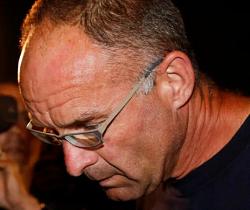Triple murderer Douglas Garland to learn Friday if appeal successful
Douglas Garland, who killed a five-year-old Calgary boy and his grandparents, will learn Friday whether the Alberta Court of Appeal will order a new trial.
Garland was convicted in February 2017 and sentenced to life in prison with no chance of parole for 75 years for the murders of Nathan O'Brien, 5, and his grandparents, Alvin and Kathy Liknes.
Much of the evidence against Garland came from the farm where he lived with his parents — that evidence included DNA from all three victims found on various items, including a hacksaw and meat hook.
In May, defence lawyer Alias Sanders argued that the trial judge, Justice David Gates, erred when he allowed evidence gathered from the farm to be presented to jurors.
On July 4, 2014, after police were pointed in Garland's direction — by his sister and brother-in-law — the lead detective directed a search of the farm, even though police did not have a warrant, believing the family members could still be alive.
While the law allows for searches under "exigent circumstances," Sanders argued the police did not have strong enough evidence linking Garland and the farm to the missing family and that the search was a violation of the killer's constitutional rights.
Sanders also argued the trial judge overemphasized the graphic nature of the evidence, which she said was prejudicial to the defence's case and undermined the presumption of innocence.
The province's top court is set release its ruling Friday morning.
In June 2014, Nathan O'Brien was having an impromptu sleepover at his grandparents' home.
The three family members were taken from the Liknes's home on June 29, 2014, and, according to the trial prosecutors, were killed on the farm north of Calgary where Garland lived with his parents.
He then burned the bodies. Pieces of teeth and bone were found in a burn pile on the property, which took investigators months to sift through.
Aerial photos that happened to capture the Garland property on July 1, 2014, around 9:30 a.m. by a digital mapping company showed what appeared to be three bodies — two larger and one smaller — laid out on the farm near some outbuildings.
During the trial, jurors heard evidence Garland was motivated by a grudge over a business relationship with Alvin Liknes that had soured years before.
Prosecutors Christine Rideout and Sarah Clive argued Garland's convictions should stand. They said Gates's comments about graphic evidence were "in keeping with his duty as a trial judge" and that the trial judge properly allowed evidence from the farm to go before the jury.
Rideout mentioned Garland had brought up his grudge against Alvin Liknes as recently as the week before the killings. The prosecutor also pointed out that the then-suspect's sister had married Liknes's son.






